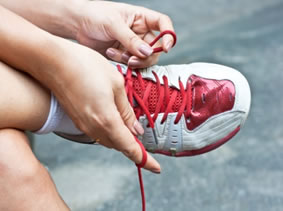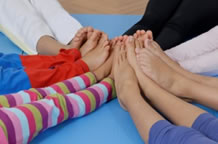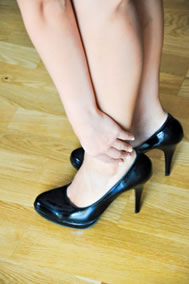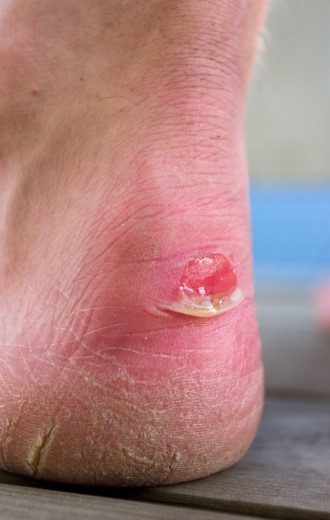Items filtered by date: October 2016
How to Shop for Shoes
 When looking for new shoes, you shouldn’t always look for a “snug” fit. Your toes should be able to have wiggle room at the front of the shoe. It is also important to have shoes that provide support and cushioning for your feet. Although price is usually a factor when shoe shopping, the cheapest shoe usually isn’t the best quality. Cheap shoes tend to be ill-fitting and they may cause injuries and blisters as a result.
When looking for new shoes, you shouldn’t always look for a “snug” fit. Your toes should be able to have wiggle room at the front of the shoe. It is also important to have shoes that provide support and cushioning for your feet. Although price is usually a factor when shoe shopping, the cheapest shoe usually isn’t the best quality. Cheap shoes tend to be ill-fitting and they may cause injuries and blisters as a result.
Finding a properly-fitting shoe is important in reducing injuries and preventing foot problems. For more information about treatment, contact Dr. Michael E. Newman of Pennsylvania. Our doctors will provide the care you need to keep your pain free and on your feet.
Proper Shoe Fitting
A common concern when it comes to foot health, having properly fitted shoes can help prevent injuries to the foot. Out feet affect our posture and gait, which in turn affects the biomechanics and overall bodily structure. With 33 joints, 26 bones, and over 100 ligaments, the potential for serious injury is much greater than one realizes. Although the feet cease growth in adulthood, they still change shape as they mature. Here are some factors to consider when it comes to investing in proper fitting shoes:
- Be sure the shoes fit correctly right away
- Ensure the ball of your foot fits comfortably in the widest portion of the shoes
- Even though they may look fashionable, improper fitting shoes can either create adverse conditions or exacerbate existing ones you may already have
- Walk along a carpeted surface to ensure the shoes comfortably fit during normal activity
Keeping in mind how shoes fit the biomechanics of your body, properly-fitting shoes is vitally important. Fortunately, it is not difficult to acquire footwear that fits correctly. Be sure to wear shoes that support the overall structure of your body. Do your feet a favor and invest in several pairs of well-fitted shoes today.
If you have any questions, please feel free to contact one of our offices located in Plymouth Meeting and Ambler, PA. We offer the newest diagnostic and treatment technologies for all your foot care needs.
Take Proper Care of Your Feet to Prevent Conditions
 Many health conditions that you didn’t know you had can be discovered through foot examinations. Melanoma, for example, is a skin cancer that can appear on the sole of your foot. Athlete’s foot is another condition that can be diagnosed from a foot examination. Athlete’s foot is a fungal infection that appears as a scaly, red rash between the toes. Lastly, clubbing in the nails can be a sign of heart or lung disease. These two diseases are two of the top causes of death in the United States.
Many health conditions that you didn’t know you had can be discovered through foot examinations. Melanoma, for example, is a skin cancer that can appear on the sole of your foot. Athlete’s foot is another condition that can be diagnosed from a foot examination. Athlete’s foot is a fungal infection that appears as a scaly, red rash between the toes. Lastly, clubbing in the nails can be a sign of heart or lung disease. These two diseases are two of the top causes of death in the United States.
Every day foot care is very important to prevent infection and other foot ailments. If you need your feet checkedcontact Dr. Michael E. Newman of Pennsylvania. Our doctors can provide the care you need to keep your pain free and on your feet.
Every Day Foot Care
Often, people take care of their bodies, face and hair more so than they do for their feet. But the feet are a very important aspect of our bodies, and one that we should pay more attention to. After all, without our feet, we would not be able to perform most daily tasks. It is best to check your feet regularly to make sure there are no new bruises or cuts that you may not have noticed before, for example.
For dry feet, moisturizer can easily be a remedy and can be applied as often as necessary to the affected areas. Wearing shoes that fit well can also help you maintain good foot health, as well as making it easier to walk and do daily activities without the stress or pain of ill-fitting shoes, high heels, or even flip flops.
Also, wearing clean socks with closed shoes is important to ensure that sweat and bacteria do not accumulate within the shoe. Clean socks help to prevent athlete’s foot, fungi problems, bad odors, and can absorb sweat.
If you have any questions please feel free to contact our offices located in Plymouth Meeting and Ambler, PA. We offer the newest diagnostic tools and technology to treat your foot and ankle needs.
The Dangerous Effects of High Heels
 Wearing high heels for elongated periods of time, especially when you’re working, can lead to long-term problems. According to Jackie Sutera, D.P.M., podiatric surgeon, “when you are in any kind of shoe that has elevation or a heel, your weight gets shifted forward to the ball of the foot.” More weight gets shifted when the heel is higher. Your back, knees, and hip have to adjust to accommodate the shifted weight, which misaligns your body. High heels can also contribute to the growth of hammertoes, bunions, and ingrown toenails.
Wearing high heels for elongated periods of time, especially when you’re working, can lead to long-term problems. According to Jackie Sutera, D.P.M., podiatric surgeon, “when you are in any kind of shoe that has elevation or a heel, your weight gets shifted forward to the ball of the foot.” More weight gets shifted when the heel is higher. Your back, knees, and hip have to adjust to accommodate the shifted weight, which misaligns your body. High heels can also contribute to the growth of hammertoes, bunions, and ingrown toenails.
High heels have a history of causing foot and ankle problems. If you have any concerns about your feet or ankles, contact Dr. Michael E. Newman of Pennsylvania. Our doctors can provide the care you need to keep your pain free and on your feet.
Effects of High Heels on the Feet
High heels are popular shoes among women because their style and societal appeal. Despite this, they can still cause many health problems if worn too frequently.
What parts my body will be affected by high heels?
- Ankle Joints
- Achilles Tendon – may shorten and stiffen with prolonged wear
- Balls of the Feet
- Knees – heels cause the knees to bend constantly, creating stress on them
- Back – they decrease the spine’s ability to absorb shock, which may lead to back pain. Also, the vertebrae of the lower back may compress.
What kinds of foot problems can develop from wearing high heels?
- Corns
- Calluses
- Hammertoe
- Bunions
- Morton’s Neuroma
- Plantar Fasciitis
How can I still wear high heels and maintain foot health?
If you want to wear high heeled shoes, make sure that you are not wearing them every day, as this will help prevent long term physical problems. Try wearing thicker heels as opposed to stilettos to distribute weight more evenly across the feet. Always make sure you are wearing the proper shoes for the right occasion, such as sneakers for exercising. If you walk to work, try carrying your heels with you and changing into them once you arrive at work. Adding inserts to your heels can help cushion your feet and absorb shock. Full foot inserts or metatarsal pads are available.
If you have any questions please feel free to contact our offices located in Plymouth Meeting and Ambler, PA. We offer the newest diagnostic tools and technology to treat your foot and ankle needs.
Blisters: Result of Friction and Unfitting Shoes
 If you find blisters on your feet, chances are that your feet are suffering from constant friction and uncomfortable shoes that do not fit. Sweat can also lead to the skin becoming moist, resulting in blisters. Prevention involves wearing properly-fitting shoes, wearing socks that wick away sweat, and proper foot hygiene. Apply moleskin or athletic tape on an area where you believe a blister may be developing to protect the skin. If you plan to pop blisters, do so with with caution, making sure to use a sterile needle..
If you find blisters on your feet, chances are that your feet are suffering from constant friction and uncomfortable shoes that do not fit. Sweat can also lead to the skin becoming moist, resulting in blisters. Prevention involves wearing properly-fitting shoes, wearing socks that wick away sweat, and proper foot hygiene. Apply moleskin or athletic tape on an area where you believe a blister may be developing to protect the skin. If you plan to pop blisters, do so with with caution, making sure to use a sterile needle..
Blisters are prone to making everyday activities extremely uncomfortable. If your feet are hurting, contact Dr. Michael E. Newman of Pennsylvania. Our doctors will assist you with all of your podiatric concerns.
Foot Blisters
Foot blisters develop as a result of constantly wearing tight or ill-fitting footwear. This happens due to the constant rubbing from the shoe, which can often lead to pain.
What are Foot Blisters?
A foot blister is a small fluid-filled pocket that forms on the upper-most layer of the skin. Blisters are filled with clear fluid and can lead to blood drainage or pus if the area becomes infected.
How do Blisters Form?
Blisters on the feet are often the result of constant friction of skin and material, usually by shoe rubbing. Walking in sandals, boots, or shoes that don’t fit properly for long periods of time can result in a blister. Having consistent foot moisture and humidity can easily lead to blister formation.
Prevention & Treatment
It is important to properly care for the affected area in order to prevent infection and ease the pain. Do not lance the blister and use a Band-Aid to provide pain relief. Also, be sure to keep your feet dry and wear proper fitting shoes. If you see blood or pus in a blister, seek assistance from a podiatrist.
If you have any questions, please feel free to contact our office located in Plymouth Meeting and Ambler, PA. We offer the newest diagnostic and treatment technologies for all your foot and ankle needs.
Tips for Comfortable Feet
 Aching feet can be very troublesome and distracting while on the job. Fortunately, there are some tips you can use to make your feet more comfortable. The first tip is to buy your shoes in the afternoon, because that is when feet swell the most. There should be about one centimeter of space between your longest toe and the end of the shoe. Another tip is to make sure your feet are moisturized. However, you should avoid putting moisturizer between your toes, because that may lead to athlete’s foot. Lastly, you should not ignore pain in your feet. If you are experiencing a constant pain that will not go away, you should go see a podiatrist for help.
Aching feet can be very troublesome and distracting while on the job. Fortunately, there are some tips you can use to make your feet more comfortable. The first tip is to buy your shoes in the afternoon, because that is when feet swell the most. There should be about one centimeter of space between your longest toe and the end of the shoe. Another tip is to make sure your feet are moisturized. However, you should avoid putting moisturizer between your toes, because that may lead to athlete’s foot. Lastly, you should not ignore pain in your feet. If you are experiencing a constant pain that will not go away, you should go see a podiatrist for help.
Every day foot care is very important to prevent infection and other foot ailments. If you need your feet checkedcontact Dr. Michael E. Newman of Pennsylvania. Our doctor can provide the care you need to keep you pain-free and on your feet.
Every Day Foot Care
Often, people take care of their bodies, face and hair more so than they do for their feet. But the feet are a very important aspect of our bodies, and one that we should pay more attention to. After all, without our feet, we would not be able to perform most daily tasks. It is best to check your feet regularly to make sure there are no new bruises or cuts that you may not have noticed before, for example.
For dry feet, moisturizer can easily be a remedy and can be applied as often as necessary to the affected areas. Wearing shoes that fit well can also help you maintain good foot health, as well as making it easier to walk and do daily activities without the stress or pain of ill-fitting shoes, high heels, or even flip flops.
Also, wearing clean socks with closed shoes is important to ensure that sweat and bacteria do not accumulate within the shoe. Clean socks help to prevent athlete’s foot, fungi problems, bad odors, and can absorb sweat.
If you have any questions please feel free to contact one of our offices located in Plymouth Meeting and Ambler, PA. We offer the newest diagnostic and treatment technologies for all your foot and ankle needs.
